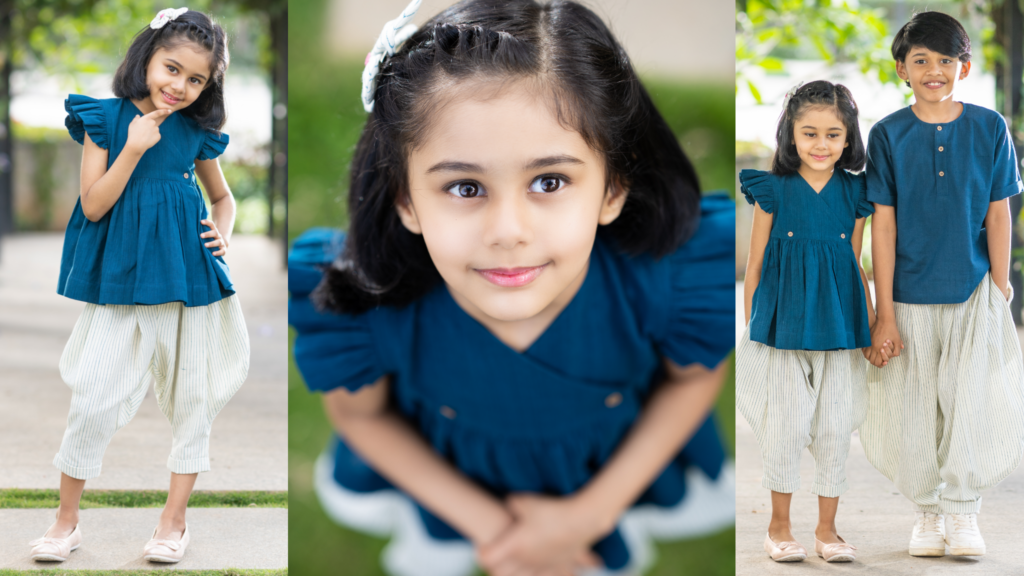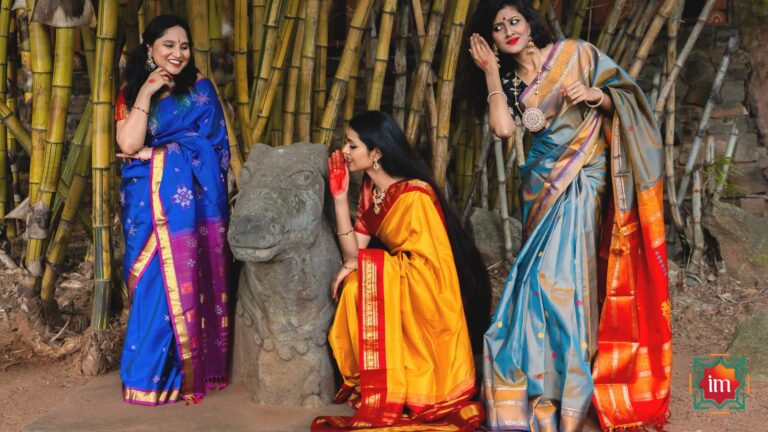Two mothers dreamt of sustainable fashion in clothing for kids and they made their dream come true.
PureCloth is the brainchild of two dynamic women cultural entrepreneurs – Ms. Nandini Girish & Ms. Dhiju Anoob.
The idea for the brand bloomed in the unlikeliest of places – in cab rides on the way to classes at National Institute of Fashion Technology (NIFT), Bengaluru. The young mothers discussed the pain and problems associated with children’s clothing while traveling together. With the knowledge and know-how they garnered from NIFT, they chose to work on a brand that would not only be gentle on a child’s skin, but also be budget and environmentally friendly.
What started with just three designs in 2018, is today a business that has offline presence in stores like Paperboat Goa, One12 Hyderabad, Paperboat Bangalore, Go Native Bangalore and also a robust online store.
USPs of PureCloth:
- Outfits designed to grow with children
- 100% organic circular design process
- Repurpose fabric scraps into accessories
- Use recycled paper package & labels
- Handwoven & hand-embroidery by traditional artisans
- Fair wage & local women empowerment
Incubated at NSRCEL, IIM Bangalore, PureCloth is a brand that believes in slow fashion and wants to be globally recognized as a high-quality, sustainable, proudly Made in India brand.
The Growth Story:
Nandini and Dhiju are IT engineers belonging to different states who bonded at NIFT, Bengaluru. Being mothers, one of their mutual pain points was children’s clothing. They recognized the distinct lack of quality and thought in the industry. This angst was amplified by the no-uniform policy in their children’s school resulting in the everyday struggle of what-do-they wear today? To top it, there was the very real problem of how quickly children outgrew their clothes. (Fun fact: A child changes about 7 sizes in 2 years!).
Once they graduated from NIFT, they decided not to lose momentum and launched their label with just three designs. They did photoshoots using their children as models and spread the word through WhatsApp. When they received 20 orders within a day, they knew they were headed in the right direction. Parents got back to them, appreciating the fabric and design of the outfits… marking the beginning of a beautiful journey that revolved around sustainable fabric and the ‘grow with me’ concept.
They quit their IT jobs with the support from their spouses and plunged right in.
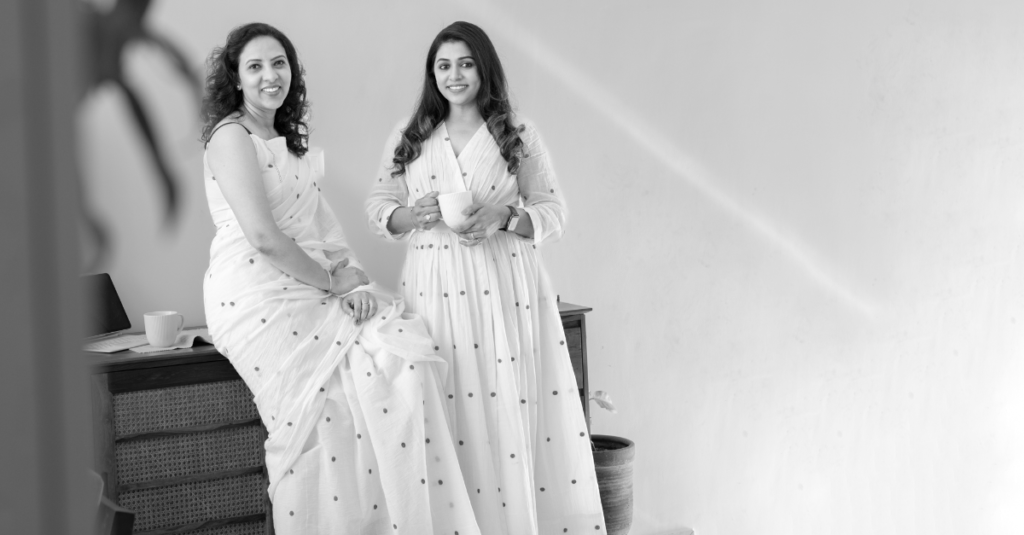
Brand Purecloth began actively posting on Instagram in 2021 and also launched their B2C website. Initially on Instagram, they gathered 600 followers via friends and word of mouth. The follower base has since grown entirely organically, without any additional marketing efforts besides social media marketing (SMM), which they started in 2022. Over the course of three years, they were able to reach 8k followers.
While the growth may not have been consistent throughout, they consistently prioritized the quality of images and content. They firmly believe in the value of organic growth and refrain from relying on paid or inorganic methods to expand their follower base.
Being bootstrapped, everything at PureCloth is done in-house except for marketing. Each one plays to her strengths – while Dhiju is hands-on into detailing, making creatives etc., Nandini is into retailing, finance, customer service etc. Though, when it comes to designing a new outfit, they do it together. Thanks to their background, they leverage technology efficiently.
PureCloth was incubated at a Women’s Startup Program (2020 Woman Startup Program 3.0 batch), short listed from 10,000 entries, chosen to be one of the top 50 at NSRCEL , IIM Bangalore.
In the words of Nandini and Dhiju, “NSRCEL has played a pivotal role in our journey, providing us with the confidence and support to start and scale our business. The mentorship and networking opportunities offered by these programs have been invaluable. They have helped us gain a deeper understanding of our business, products, and customers. Through the program, we have connected with like-minded individuals and experts who have guided us on our entrepreneurial path.
We firmly believe that anyone with a good idea and a passionate mindset can start a business. Organizations like NICE & NSRCEL empower aspiring entrepreneurs to take their ideas to the next level.”
Processes and Value System:
PureCloth, believes in making a difference right from the get-go and so have a process in place. In their effort to be as eco-friendly as possible, they choose organic cotton for the majority of their collection. The PureCloth journey starts in the fertile soil of certified organic cotton farms where cotton is grown in harmony with nature, using sustainable farming practices. This results in a purer, cleaner cotton that’s free of harmful chemicals and toxins, making a difference for the environment, for farmers, and for those who wear their products.
Nandini and Dhiju spent almost 6 months just identifying where their fabrics were going to come from. They now have a list of vendors who can supply organic fabric that is soft on the skin and durable.
Just as they are particular about the fabric, they are also invested in the dyeing part of the process. They stayed at Khadi Collective, Karnataka, to explore the use of dyes and color fixing using the natural products available locally.
The duo take pride in using 100% eco-friendly dyes to safeguard the children and the planet. Even in this industrial era, their dyes are derived from natural materials such as plant leaves, roots and bark that were available to mankind for the coloring of textiles until the discovery of the first synthetic dye in 1856. For example, their Baby yellow romper is dyed using turmeric while their Peach pinafore is dyed using pomegranate peels.
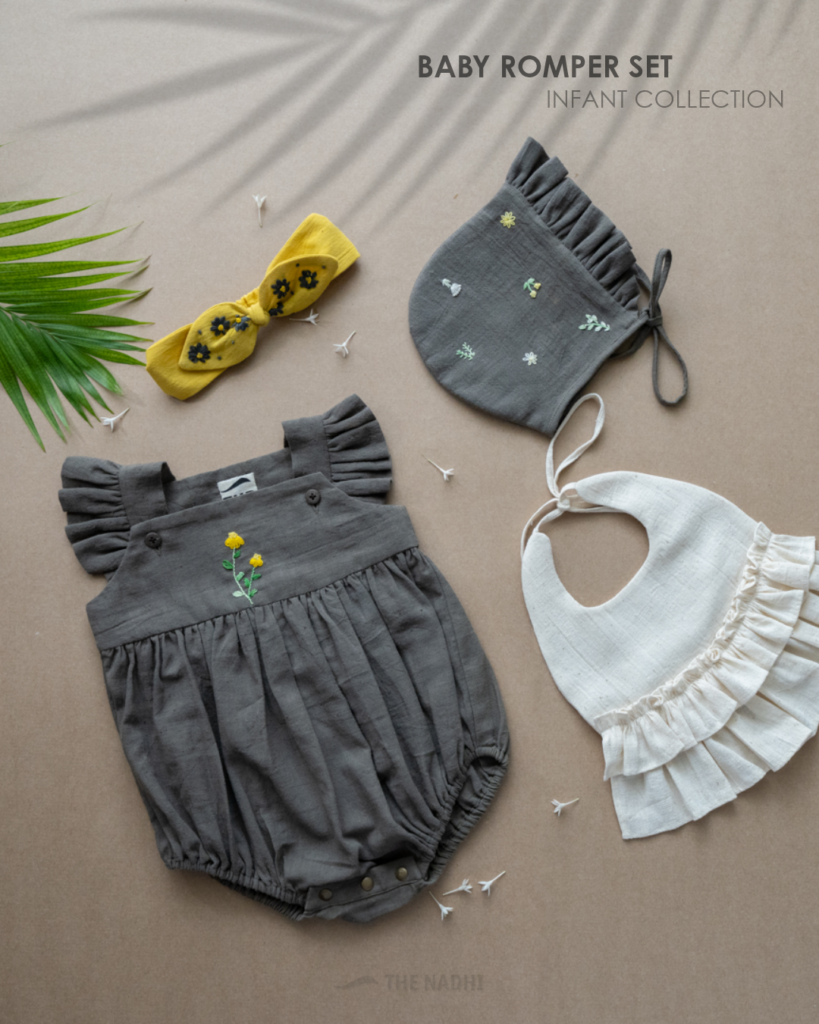
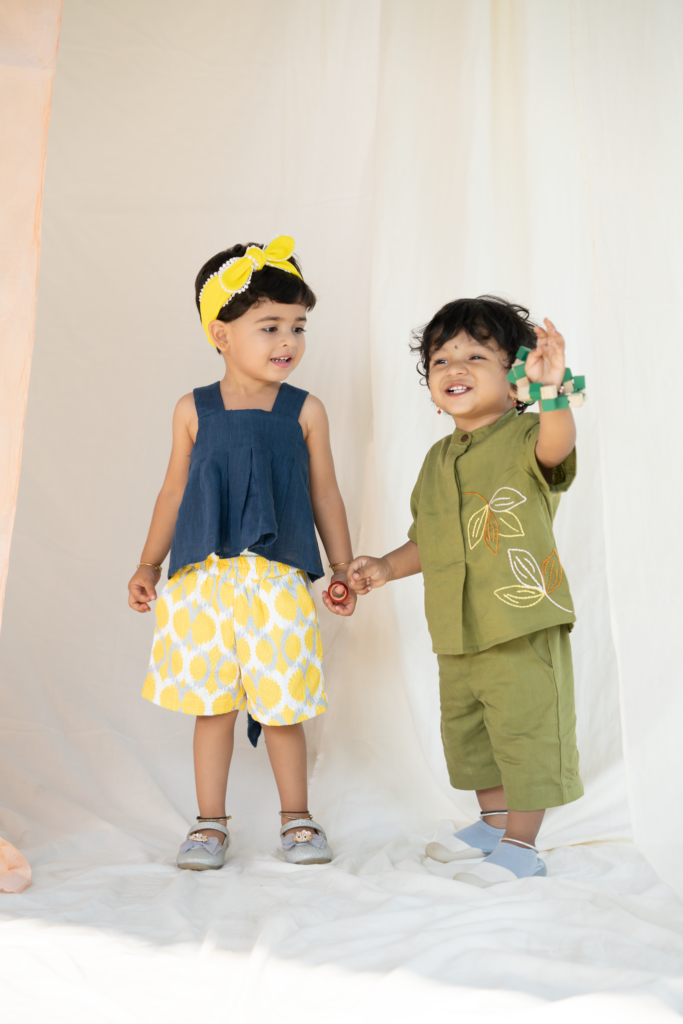
Moreover, PureCloth only sources from a group of artisans across India who have the skill of dyeing, passed down from generations.
Their handwoven fabrics are sourced from weavers across India and use handlooms instead of power looms. Each weave has a story of an artisan behind it, with the added advantage of giving the outfit a premium look and feel.
For the embroidery work, they connected with a local NGO who put them in touch with under-privileged women who live within a 10-15 Km radius of the PureCloth office at J.P. Nagar, Bengaluru. The women underwent training in the office and now, they take the raw material and drop the finished product once the work is completed. The training ensures that neatness, quality and precision are on par with the best in the industry. This gives the women artisans time flexibility and financial independence.
Catch Phrase – Circularity:
Early on, one of the most important questions the founders of PureCloth asked themselves was, ‘how can we design without depleting the earth and its resources?’ They explored various business models to ensure safe materials circulate back into the ecosystem.
Today their designs focus on circular principles and are in-line with Ellen McArthur Foundation’s Vision of a Circular Economy for Fashion.
Everything they use, from the fabric to the packaging material is eco-friendly. They even use the scraps leftover from making their outfits for accessories.
- Purecloth.co circularity in a nutshell
- 100% Rainfed Organic Cotton
- Locally made
- Designed for extended use
- Eliminates waste during production
- Recycled and plastic-free packaging
Grow-with-me Principle:
From birth, kids grow inch by inch. 200+ clothes get disposed of in the first 2 years! They change nearly 15 sizes over a period of 12 years. Being mothers themselves, Nandini and Dhiju have first hand experience of this linear take-make-waste model that leads to environmental pollution. Therefore they launched their “Grow with me” collection that inspires extended use. Every day in their design studio, they learn and upgrade their design principles. The shoulder closures and hem finishes are thoughtfully constructed to adjust the length as required. The relaxed cuts allow free movement with ease to wear. Very often, their designs reflect a feedback or thought provided by their end users aka the children because they firmly believe ‘parents are customers but children are the consumers’.
PureCloth’s customers are located in major metro cities and urban centers across India, and they also have a growing number of international customers. Their customer base primarily consists of individuals who are true believers in sustainable living and conscious consumerism. Additionally, many customers are drawn to the brand for its unique and innovative designs.
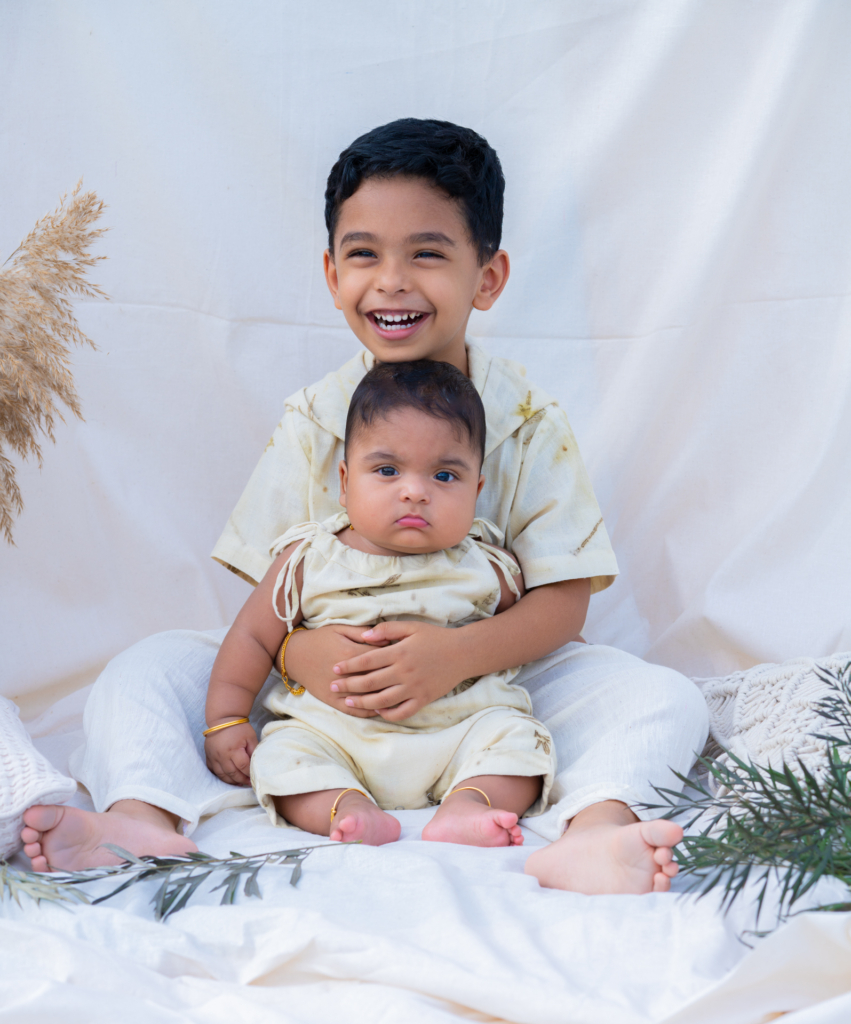
PureCloth reciprocates this love and trust by placing high value on customer feedback. They actively engage with their customers by reaching out to them individually to understand their concerns, suggestions, and opinions. They also organize pop-up events where they directly interact with customers and gather feedback that helps drive improvements in product design, quality, customer service, and overall brand experience.
As a company, PureCloth wants children to become more conscious about what they wear and how their clothes are made. Following this route of thought, they are very particular about folding and the packaging of the outfits in an elegant, eco-friendly manner. They want the child to have the experience being thrilled right from when they receive the clothes in a special muslin bag.
This child centric thought is also reflected in their tagline: Raising eco-conscious kids, one outfit at a time!
Nandini and Dhiju believe that every act, no matter how small, is important when it comes to conserving nature. They want to leave a better world for their future generation.
Their vision for the future includes:
- Subscription based kidswear
- Return and recycle of used clothes
- Shipment using vehicles that use renewable energy
They believe that every entrepreneur has the power to change the world. Admittedly, the journey is not easy and it is therefore important to have a support system, mentors, and guide to help you soldier on.
As a brand that is committed to sustainable and ethical production, Purecloth faces some unique challenges with the Indian customer base and one of them is lack of awareness.
The perception that organic and sustainable products are expensive and not accessible to everyone is a challenge. Many customers are used to fast fashion and cheaper products, and may not be willing to pay the premium for organic and sustainable products. This means that customers have to be actively educated about the value of these products and why they are worth the investment.
The second challenge is that of supply and the availability of organic and sustainable materials in India. While there is a growing demand for these materials, the supply is still limited, which can make it difficult to source high-quality materials. This means that the entrepreneurs need to constantly put efforts to strengthen their supply chain management to ensure that they continue to use only the best possible materials for their products.
In-spite of the challenges and roadblocks, Nandini and Dhiju remain committed to their values and believe that with education and awareness, they can continue to grow their customer base while making a positive impact on the environment and society.
